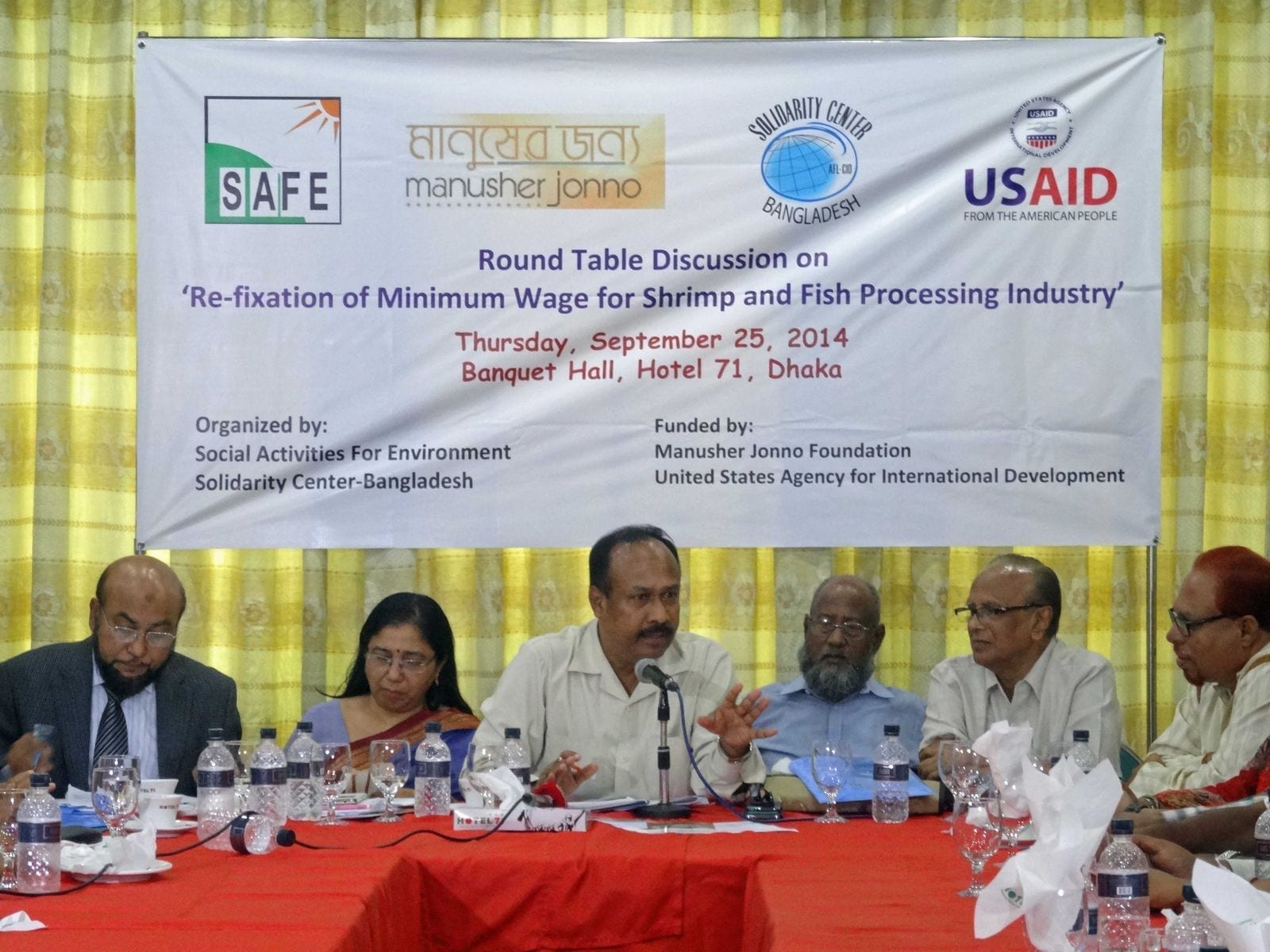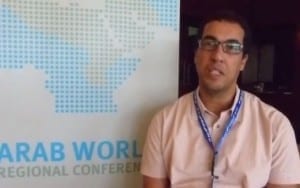
Oct 10, 2014
Labor and human rights activist and long-time Solidarity Center ally Kailash Satyarthi won the 2014 Nobel Peace Prize, the Nobel committee announced this morning. He shares the prestigious award with Malala Yousafzai, the Pakistani girl who survived a brutal 2012 Taliban attack for her stance on girls’ education.
As a grassroots activist, Satyarthi has led the rescue of more than 78,500 child laborers and survived numerous attacks on his life as a result. As a PBS profile describes Satyarthi’s work: “His original idea was daring and dangerous. He decided to mount raids on factories—factories frequently manned by armed guards—where children and often entire families were held captive as bonded workers.”
Solidarity Center Asia Regional Director Tim Ryan said, “Kailash’s lifetime commitment to the cause of eradicating child labor is an inspiration to every human rights defender around the world to promote the rights of the most vulnerable, the most economically exploited young workers and the paramount importance of finding ways to secure basic education for all children around the world.”
Satyarthi’s decades of work to end exploitive child labor have encompassed advocacy for decent work and working conditions for adults, including domestic workers, because impoverished families must often make the difficult choice of sending their children to work for the sake of family survival.
“Child labor is a largely neglected, ignored, denied aspect of human rights,” Satyarthi told the Solidarity Center in a recent interview. “This is crime against humanity and is unacceptable in any civilized society.”
In 1998, Satyarthi created the Global March Against Child Labour, a coalition of unions and child rights organizations from around the world, to work toward elimination of child labor. Global March members and partners are now in more than 140 countries. Many of these civil society groups, including the Solidarity Center, came together to launch End Child Slavery Week November 20–26, with the focus this year on pushing the United Nations to make ending child labor a key priority of its 15-year action now under development.
Winning the Nobel “will help in giving bigger visibility to the cause of children who are most neglected and most deprived,” Satyarthi said upon learning he won the prestigious prize. “Everyone must acknowledge and see that child slavery still exists in the world in its ugliest face and form. And this is crime against humanity, this is intolerable, this is unacceptable. And this must go.” (Listen to his interview with the Nobel Prize team.)
At age 26, Satyarthi gave up a promising career as an electrical engineer and dedicated his life to helping the millions of children in India who are forced into slavery by powerful and corrupt business and land owners.
In 1994, Satyarthi spearheaded Rugmark (now known as GoodWeave), the official process certifying that carpets were not woven by children, and aimed at dissuading consumers from buying carpets made by child laborers through consumer awareness campaigns in Europe and the United States.
His life’s achievements encompass a range of human rights work. Satyarthi created a series of “model villages” free from child exploitation, and some 356 villages have emerged in 11 states of India since the model’s inception in 2001. The children of these villages attend school and participate in a wide range of governance meetings to discuss the running of their villages, through child governance bodies and youth groups.
“Showing great personal courage, Kailash Satyarthi, maintaining Gandhi’s tradition, has headed various forms of protests and demonstrations, all peaceful, focusing on the grave exploitation of children for financial gain,” said Nobel Committee Chairman Thorbjorn Jagland said.
Satyarthi’s award of the Nobel Prize is the latest high-profile recognition of worker rights activists in the last month. Earlier this week, Alejandra Ancheita, founder and executive director of the Mexico City-based ProDESC (Project for Economic, Cultural, and Social Rights), won the prestigious international Martin Ennals Award for Human Rights Defenders. And in September, Ai-jen Poo, founder and director of the National Domestic Workers Alliance, became a MacArthur ‘Genius’ Grant recipient.

Oct 9, 2014
Swaziland has ordered all worker and employer federations to stop operations immediately, a demand issued yesterday in a resolution by the government cabinet. The order effectively disbands the Trade Union Confederation of Swaziland (TUCOSWA), a Solidarity Center ally.
Minister of Labor and Social Security Winnie Magagula, quoted in the Times of Swaziland, said that in the wake of the resolution, “all federations are non- existent in terms of the Industrial Relations Act and should stop operating immediately until the amendment of the Industrial Relations Act has been passed by Parliament.”
The move runs counter to international labor standards, including the right of freedom of association.
“This is a blatant and outrageous attack on the ability of working people to form associations of their choice and stand up for their rights,” said Solidarity Center Executive Director Shawna Bader-Blau. “By denying workers a voice at work, the Swazi government is preventing workers from achieving safe and healthy workplaces and wages that will support themselves and their families.”
A recent TUCOSWA survey of more than 400 textile workers in Manzini, Swaziland, found that workers in the textile sector are subject to harsh and sometimes abusive conditions, many of the country’s labor laws are routinely violated by employers, and union activists are targeted by employers for punishment.
In June, the U.S. government took the rare step of suspending African Growth and Opportunity Act (AGOA) trade benefits for Swaziland, citing the Swazi government’s systematic violations of fundamental worker rights, including lack of ability for unions to register.
Magagula was quoted as citing the International Labor Organization (ILO) as directing the move, a charge the ILO unequivocally denies.
Condemning the action, AFL-CIO International Director Cathy Feingold wrote in a letter to Swazi Prime Minister Sibusiso Dlamini that it “is the latest in a series of actions designed to repress and restrict legitimate trade union activities in Swaziland.”
Sharan Burrow, International Trade Union Confederation (ITUC) general secretary, said, “We demand that the ruling be rescinded immediately.” The ITUC also sent a letter to the Swazi prime minister, condeming the move.
In August, some in the Swazi government falsely accused TUCOSWA General Secretary Vincent Ncongwane and human rights lawyer Sipho Gumedze of taking a stand against AGOA benefits for Swaziland when they were in Washington, D.C., as part of a delegation of 40 African trade union leaders.
The 2014 U.S. State Department human rights report cites serious human rights violations in Swaziland, including arbitrary or unlawful killings by the government or its agents; severely restricted freedom of assembly, including violence against protestors; jailing of trade union leaders; the deregistration of TUCOSWA and the banning of strikes.

Oct 7, 2014
Alejandra Ancheita, founder and executive director of the Mexico City-based ProDESC (Project for Economic, Cultural, and Social Rights), today won the prestigious international Martin Ennals Award for Human Rights Defenders.
The award recognizes her courage and tireless search over the past 15 years for new ways to advance the rights of some of the most vulnerable workers in Mexico, including mine workers, migrant workers, child laborers and agricultural workers.
Ancheita, a Mexican lawyer and activist who leads the fight for the rights of vulnerable and excluded workers, migrants, communal landowners and indigenous communities, founded ProDESC in 2005. ProDESC is a long-time Solidarity Center ally whose work includes an ongoing campaign seeking justice for miners denied their right to organize for improved working conditions at the La Platosa mine in La Sierrita, Durango, Mexico.
“The award demonstrates that power can be held accountable and that worker activists, union leaders, students and others who literally risk their lives for justice do not fight unnoticed or alone,” says Solidarity Center Executive Director Shawna Bader-Blau. “We’re so excited that Alejandra has received this honor and humbled to stand with her and ProDESC in the struggle for worker and human rights throughout Mexico.”
The Martin Ennals Award for Human Rights—known as the “Nobel” of human rights awards, is selected by the international human rights community and given to human rights defenders who have shown deep commitment and face great personal risk. Members of the organization include Human Rights Watch and Amnesty International.
Watch a video about Ancheita.

Sep 29, 2014
Mukta, who works in a shrimp factory in Khulna, Bangladesh, makes $50 per month but that wage is not enough to support his family.
“Although employers should raise wages every year according to the law, they don’t follow the rules,” he said. “I have worked in my factory for nine years and my salary has increased only once.”
Mukta joined a meeting on the wages in the shrimp and fish processing industry with representatives from labor, business and civil society last week. Organized by the Solidarity Center and Social Activities for the Environment (SAFE), the event in Dhaka, the capital, featured Md. Mujibul Haque Chunnu, state minister at the Ministry of Labor and Employment.
The government recently directed the Minimum Wage Board to reassess the minimum wage for workers in the shrimp and fish processing sector. The board, established in 2009, has not revisited the wage level since then.
“It has been five years since the minimum wage was reviewed in the sector,” said Solidarity Center Bangladesh Country Program Director Alonzo Suson. “Now is the time to move toward a new consensus for a living wage for workers in the shrimp industry. A new minimum wage level will not only benefit the workers but the entire community and can make good business sense for a more productive sector.”
Representatives from SAFE, the Bangladesh Frozen Foods Exporters Association (BFFEA) and an academic from Rajshahi University presented their analyses and recommendations based on current conditions and wage levels in the sector. Participant, including union leaders, members of parliament, employers and nongovernmental organizations, then engaged in a vigorous discussion.
Shaheen Anam, executive director of the Manusher Jonno Foundation, a human rights foundation that helped support the event along with U.S. Agency for International Development (USAID), noted the improved working conditions in the shrimp and fish processing sector which resulted from the work of “labor activists over the last several years.” But Anam pointed out that “these activists have faced a lot of threats … especially in the Khulna region.”
In 2013, the BFFEA, the Bangladesh Shrimp and Fish Foundation (BSFF) and the Solidarity Center signed a memorandum of agreement to implement worker rights according to Bangladesh labor law and International Labor Organization (ILO) core labor standards and to give workers the right to form trade unions.
Sep 25, 2014

Said El Hairech, general secretary of the National Union of Port Workers, jailed for union activity in 2012 is now celebrating a new bargaining pact. Credit: ITF
Dock workers in Tangiers, Morocco, successfully negotiated a collective bargaining agreement yesterday after a two-year struggle for worker rights that involved the wrongful arrest of union leaders for union activity and an international campaign to free the two men.
Significantly, the new pact with the global port operator APM Terminals includes respect for trade union rights along with a commitment to social dialogue, according to Said El Hairech, general secretary of the National Union of Port Workers (Union des Syndicats des Transports), an affiliate of the Moroccan Labor Union (UMT) and of the International Transport Workers’ Federation (ITF). The agreement with APM, a global network that employs 20,300 employees in 67 countries with interests in 70 port and terminal facilities, also improves working conditions and paid time-off for trade union representatives.
“This CBA embodies what we want—dynamic economic and social objectives,” said El Hairech, who also is chairman of ITF’s Arab World Regional Conference.
In 2012, El Hairech and Mohamed Chamchati, general secretary of UMT’s Merchant Seafarers’ Union, were arrested and imprisoned before eventually being released in October and November after the ITF launched a global solidarity campaign in support of the two men. The Solidarity Center worked to raise awareness about the campaign along with the UMT, a longtime ally.
The cargo port of Tangier-Med is a flagship development project for Morocco that has attracted significant international investment, and El Hairech says the agreement makes it clear that “union and management are working towards a common goal here: ambitious economic expansion in the framework of a common perspective on social responsibility.”





